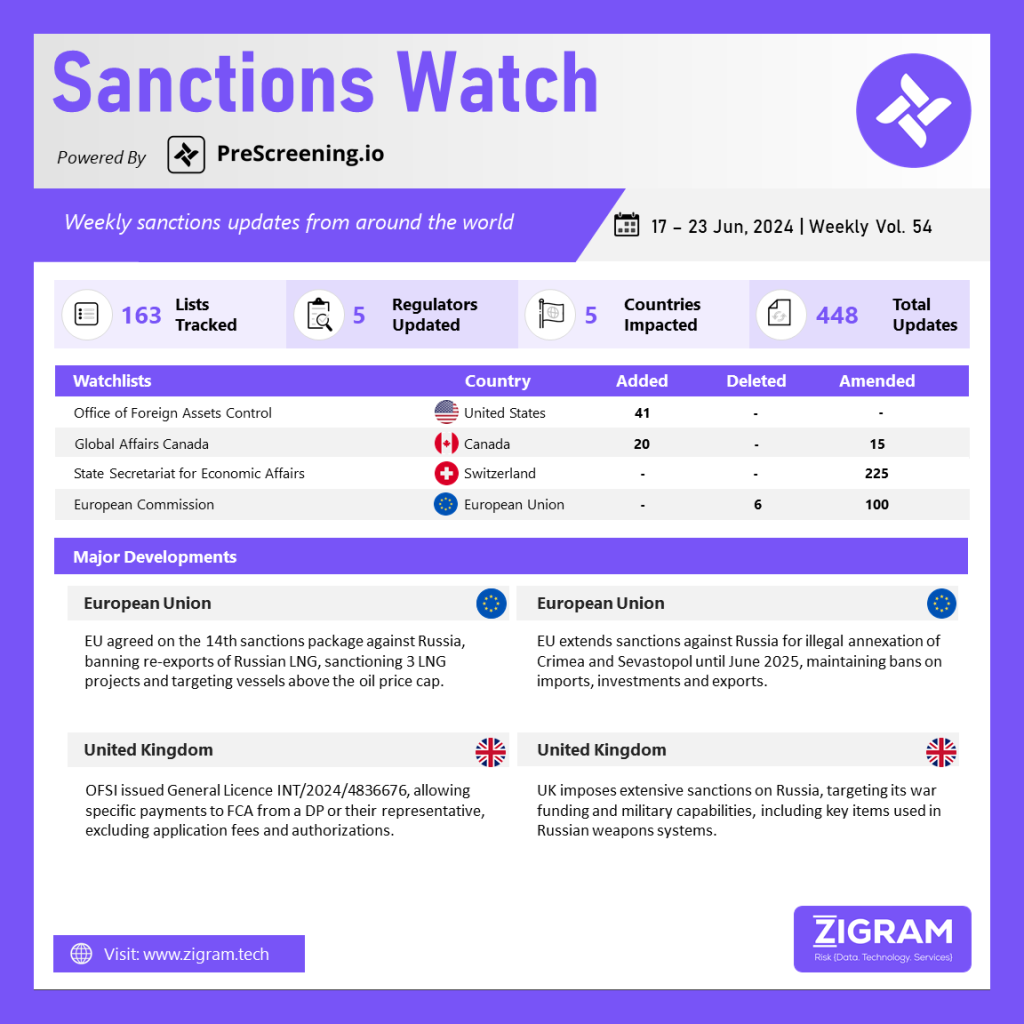In the latest edition of our Sanctions Watch weekly digest, we present significant updates on sanction watchlists and regulatory developments.
The European Union has agreed on a 14th sanctions package against Russia over its war in Ukraine, marking the first restrictions on Russian gas. This package includes a ban on re-exports of Russian liquefied natural gas (LNG) in EU waters but stops short of banning imports. Some EU countries still import pipeline gas from Russia via Ukraine. Experts say the measure will have minimal impact as trans-shipments to Asia constitute only 10% of Russian LNG exports. The package also sanctions three Russian LNG projects and allows Sweden and Finland to cancel Russian LNG contracts. Belgium, the current EU presidency holder, stated that the package aims to close existing loopholes. European Commission President Ursula von der Leyen emphasized the package’s impact on Russia’s access to key technologies and energy revenues. Despite a month of debates, a proposal to prevent circumvention through EU subsidiaries was dropped but might be included later. The package also tightens measures against the shadow fleet moving Russian oil outside the G7 price cap and adds entities and individuals to the EU sanctions list, totaling 2,200. Formal approval is expected at the upcoming EU foreign ministers’ meeting.
The European Union has extended its sanctions against Russia for another year in response to the illegal annexation of Crimea and Sevastopol, now effective until 23 June 2025. Originally imposed in June 2014, these sanctions include bans on importing products from the annexed regions into the EU, as well as restrictions on infrastructural and financial investments and tourism services. Additionally, the export of specific goods and technologies to Crimean companies, particularly in the transport, telecommunications, energy sectors and for the exploration of oil, gas and mineral resources, remains restricted. The EU condemns Russia’s annexation of Crimea and Sevastopol as a violation of international law. Since 2022, Russia’s aggression against Ukraine has further violated Ukrainian sovereignty. The EU is committed to supporting Ukraine’s independence, sovereignty and territorial integrity and continues to uphold its policy of non-recognition regarding Crimea and Sevastopol.
The Office of Financial Sanctions Implementation (OFSI) has issued General Licence INT/2024/4836676, authorizing specific payments to the Financial Conduct Authority (FCA) from a Designated Person (DP) or their representative. Permissible payments under this license encompass any obligatory payments to the FCA, excluding fees for certain applications or variations thereof related to FCA-regulated activities. Additionally, it encompasses payments to the FCA for levies imposed by the Financial Services Compensation Scheme’s scheme manager under Section 213 of the Financial Services and Markets Act 2000. Moreover, it includes payments to the FCA collected by them on behalf of the Financial Reporting Council (FRC). This license delineates the framework within which certain financial transactions are permitted, streamlining regulatory compliance processes for entities subject to OFSI oversight.
In response to Russia’s invasion of Ukraine, the UK has implemented a robust sanctions package to disrupt funding for Russia‘s military activities, impose significant economic costs and demonstrate solidarity with Ukraine. These measures have severely hindered Russia’s capacity to sustain its aggression and have had a considerable impact on its economy. The UK’s trade restrictions are designed to obstruct Russia’s access to critical goods, technologies and revenues necessary for its military efforts, particularly targeting items essential for Russian weapons development. The sanctions list, categorized into four tiers, includes electronic components crucial for weapons systems, many of which have been discovered on the battlefield in Ukraine. Businesses are advised to conduct thorough due diligence to prevent the procurement of restricted goods by Russia through non-sanctioned countries. The UK is collaborating with international partners to combat sanctions avoidance and evasion, including closing off potential routes used by Russia to circumvent sanctions.
- #EuropeanUnion
- #RussianOil
- #Ukraine
- #ExportBan
- #Crimea
- #Sevastopol
- #UnitedKingdom
- #RestrictionsOnFinancialInvestments
- #ImportBan
- #ViolationOfInternationalLaw
- #SanctionsWatch
- #RegulatoryCompliance
- #TradeCompliance
- #SanctionsEnforcement
- #SanctionsMonitoringBoard
- #OFSI
- #GeneralLicence
- #DesignatedPersons
- #DesignatedPerson
- #RussianWeapons
- #DueDiligence
- #RestrictedGoods

